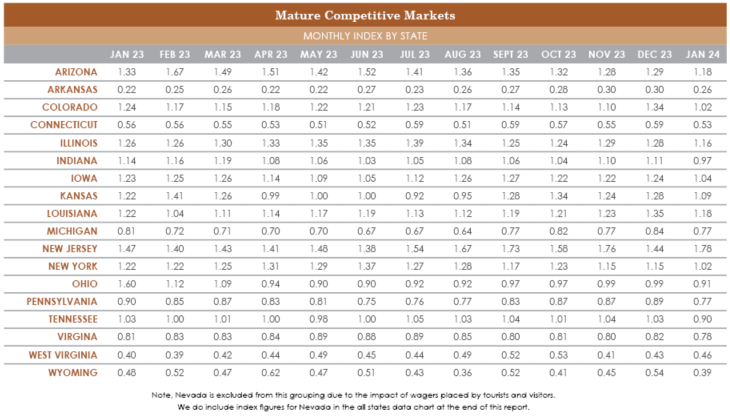RubinBrown Sports Betting Index: January 2024 Analysis
RubinBrown Sports Betting Index: January 2024 Analysis
January Sports Betting Index (SBI)
In the chart below, we present our RubinBrown Sports Betting Index (SBI). The SBI is based on our proprietary index of the leading sports betting states in the U.S. To continue to best reflect current market conditions, we’ll occasionally adjust the components of the index. To better compare competitive conditions, our index numbers focus in on a group of mature, competitive states. Therefore, a state with an index score of 1.15 had a raw index score of 15% greater than the average, while a 0.90 index score shows a 10% lower than average result.
LEARN MORE ABOUT THE RUBINBROWN SBI

With the first month of the year now fully reported, things appear to be stabilizing on the RubinBrown SBI. We note the state of New Jersey had another blockbuster month with $1.7bn handle, the highest one month handle ever outside of New York. Reports have indicated the cause of this spike to be an initiative by one of the Meadowland’s skins (FanDuel, SuperBook, Fanatics/PointsBet) to revitalize their VIP program. The Garden State’s success in growing sports betting handle is so extreme that it is impacting the SBI in an outsized manner.
For the rest of the mature states we track, January 2024 handle was modestly higher than January 2023 and slightly below the strongest two months seen in November and December 2023. With fewer football games to bet this is a typical pattern seen and for the most part we can now wrap up the football season with just the singular Super Bowl being held outside the September to January season.

An interesting recent development in the market has been states producing decreased handle, yet increased hold percentage and revenue. Led by the larger markets of New York, Illinois and Pennsylvania, the majority of states have seen the seasonal drop in handle from November through January, yet revenues have risen. Market sources have revealed a renewed emphasis on parlays as the driving force producing this anomaly. While the long-term sustainability of this tactic is uncertain, the short term success is apparent.
On March 11th of this year, North Carolina online sports betting began. In person retail sports betting has been offered since 2019, but for most state residents sports betting was an inconvenient hour-plus drive before statewide mobile options were offered. According to GeoComply, 370,000 accounts were active during the first 48 hours of sports betting. During a state lottery commission meeting it was noted that $116.8 million was wagered during the first 7 days of operations. Now, the nearly 11 million residents of the state, as well as many residents of South Carolina and Georgia, key contributors to the state’s tribal casinos, are served by eight sports betting operators. This includes established Daily Fantasy Sports operator Underdog’s first online sports betting offering.
Even amidst strong growth and record numbers, the coming months will likely prove to be a test for the industry as it tries to maintain strong growth in maturing market conditions. The upcoming 2024 football season is likely to have only North Carolina and Vermont as new market entrants. Important NFL and college football states such as Texas, California, Missouri, Georgia, and Minnesota still won’t have legal sports betting. This will lead to roughly 90 million people with their only options being either crossing borders or betting with offshore operators during the forthcoming season. New market growth in 2024 will pale in comparison to the strong markets added this past year. New Jersey figures to moderate or possibly regress a bit as its January numbers almost defy explanation.
Operators continue to wisely pull back on promotional spending. In the states that provide promotional spend amounts, we have seen these numbers settle in at 1.5-3.5% of total handle, with the higher amounts in states that allow for operator-friendly promotional tax deductions. We expect these amounts to further dissipate as the state-specific promotional deductions continue to be phased out and many states reach further levels of maturity.
We may also provide slightly more competition to sports betting as several states consider legalization of online casinos. Currently, 7 states allow online gaming, with Rhode Island being the most recent addition to the list. Potential new entrants are Maine, New Hampshire, and Maryland. Obviously, based on its size, Maryland would be the most significant of these possible adopters but with a current lack of momentum in legislatures and the timing of required referendums to approve online gaming in most states, any new states going live in 2024 seems like a longshot.
As the year plays out, we expect the SBI to provide insights on how maturing markets are evolving and possibly provide early warning signs of waning growth.

Published: 04/04/2024
Readers should not act upon information presented without individual professional consultation.
Any federal tax advice contained in this communication (including any attachments): (i) is intended for your use only; (ii) is based on the accuracy and completeness of the facts you have provided us; and (iii) may not be relied upon to avoid penalties.